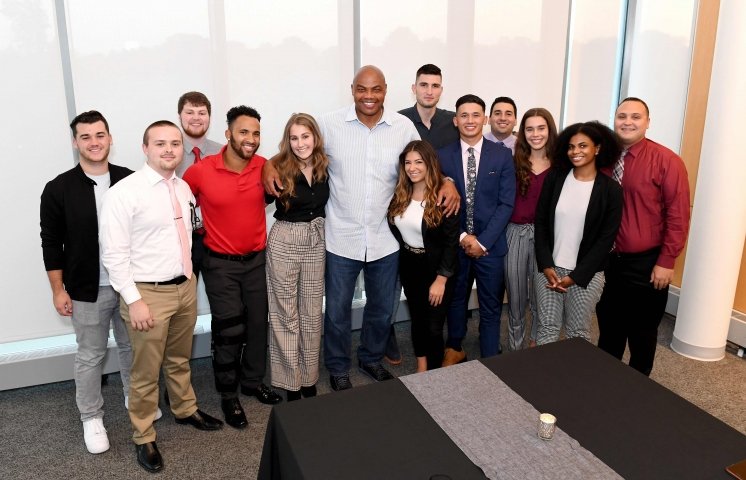NBA legend Charles Barkley speaks at Rowan’s Pfleeger Concert Hall
NBA legend Charles Barkley speaks at Rowan’s Pfleeger Concert Hall

Somehow, the "Round Mound of Thoughtfulness and Lifelong Booster of Higher Ed" does not have the same ring.
Be that as it may, Charles Barkley, NBA Hall of Famer, 11-time All-Star, 1991 league MVP, Emmy Award-winning sports analyst, and, oh yeah, a man formerly known as “The Round Mound of Rebound,” addressed the Rowan University community Oct. 1.
Barkley, who held a capacity crowd of 800 rapt in Pfleeger Concert Hall, appeared on campus at the behest of his friend, Neil Hartman, a Philadelphia-area broadcasting legend who this year became director of Rowan’s Center for Sports Communication & Social Impact and who moderated the program.
A contemporary of some of the greatest basketball players ever including Michael Jordan, Scottie Pippen, Magic Johnson, Larry Bird and Patrick Ewing, with whom he played on the 1992 U.S. Men’s Olympic “Dream Team,” Barkley said he routinely urges young men and women to not pursue careers in pro sports.
At times a controversial player, Barkley in 1993 declared that sports figures are not role models and, in his Rowan appearance, responded to a student’s question about that position, which he espoused in a Nike commercial.
“I was trying to start a debate,” said Barkley, now 56. “When I speak at schools, so many young men think they’ll play in the pros, and they won’t. My point was please get your education, it dictates your life.”
In fact, Barkley said, a free college education, and not NBA stardom, was his goal.
Coming from a small Alabama town in which his mother worked as a domestic and his grandmother in a factory, Barkley said he dreamed of taking care of his family.
Though gifted athletically, in high school he was small for basketball but had a growth spurt senior year in which he grew from 5:10 to 6:5 and Auburn University drafted him.
“I was lucky,” Barkley said. “But I want kids, especially young black kids, to know they don’t have to be a jock or an entertainer. They can be a doctor, a lawyer, an engineer, whatever they want.”
And “keep quiet on social media”
Barkley has won three Sports Emmy Awards for "Outstanding Studio Analyst" for his work on TNT and has authored four books including the autobiographical Outrageous; I May Be Wrong, But I Doubt It; and Who's Afraid of a Large Black Man?, the last a collection of interviews with leading figures in entertainment, business, sports and government, including Presidents Bill Clinton and Barack Obama.
Always opinionated, a quality he said makes him a good sports analyst, Barkley said he does not do social media and has never played a video game.
When asked by a student about athletes responding to criticism, Barkley said they never should.
“My advice is to stay off social media,” he said. “You’re going to get criticized. That’s the way it works.”
He also, to the surprise of many, said the broadcast booth can be “boring as hell.”
On game night, “we’re in the studio for six hours but when it’s a bad game it feels like 12.”
That said, Barkley said there are plenty of great careers, like those the College of Communication & Creative Arts prepares students for, behind and beside the camera.
“There are lots of jobs in this business and lots of ways to make money behind the scenes,” he said.
Ultimately, Barkley implored students to make the most of their time in college but to always keep their eye on the goal.
Asked by a student for advice on finding meaning in life, Barkley referred to advice he gives his own daughter.
“This is the last time you’re going to have fun,” he said with a broad, world famous smile. “When you leave here you’re going to work for 40 years. Do something you like to do.”
Rowan University’s Center for Sports Communication & Social Impact started during the 2018-19 academic year in conjunction with a new major through the CCCA, Sports Communication and Media. The center's mission is to advance the success of students majoring in Sports Communication and Media (SportsCAM), to make a positive difference in society by producing students and graduates who use sport as a platform to promote social justice and service and to increase media-related sports opportunities for students of diverse backgrounds. Last year, legendary basketball coach George Raveling delivered the center’s inaugural address.